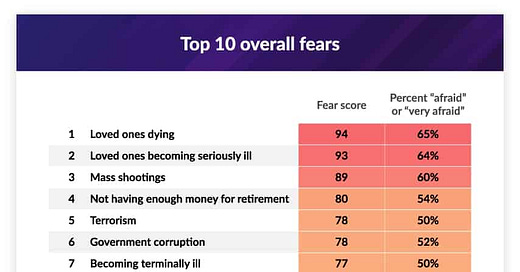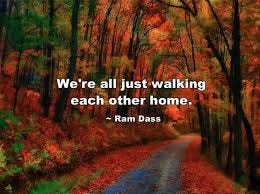Most of us are scared of death. I has always heard that most people’s #1 fear was public speaking. Fear of death was #2. Then I realized we live in a different day and age. Thanks to the world we live in and the 24-hour news cycle, different fears are vying for our brain space. I think you would agree with the statistics below. Following the years we’ve had, public speaking doesn’t seem so bad.
You could argue that these fears are the same fears as those living in the first century. Fear of early death, leprosy (exile), and Roman occupation seem more on par with our fears today than public speaking and spiders.
Fear has always been with us. And a lot of fear relates to death and dying. Fight it or deny it but let me tell you, we aren’t getting out of here alive. You, me, everyone you lay eyes on is going. to. die.
Am I morbid? No. Am I fascinated by death? No (well, kinda). I am, however, fascinated by living and living well.
The last Klesha deals with exactly this, the fear of death, or the clinging to life, abhinivesha. Fear creates suffering. I’m not saying to go ahead and take up motorcyling or eat grey meat with reckless abandon. Do not consider this your permission slip to become the daredevil you’ve always dreamed of being. I am talking about the unrealistic expectation that avoiding all carcinogens, eating 100% organic, trusting in current medical science, and a facelift will keep you young and vibrant … forever. Give it up. You’re gonna die anyway.
Death. We don’t want to talk it as if the mere nature of talking about it will cause us to die. Most of us are scared to death of death. When we realize how little we think about it, talk about it, and plan for it, we realize how riddled with fear we are. We live(?) as if it isn’t going to happen. You would be shocked at how many people don’t even have a simple will.
Death. Doctors don’t even want to talk about it. They will talk about the life saving measures, treatments, and the trial medications available. I appreciate the optimism. I do. Thanks to these advances many people have gone on living many more [happy] years. For others, the diagnosis and prognosis will not allow for that.
Enter Hospice. They provide medical support during end of life care.
Enter Death Doulas. They provide non-medical support during end of life care.
Never heard of Death Doulas? Let me fill you in. You have heard of a Birth Doula. They provide physical and emotional support before, during, and after birth. Man, if I could go back in time and get me one of them! Did I manage to have three children without one? Yes. Would it have been nice to have someone advocating for me, supporting me, and guiding me through an event that’s kind of a BFD? Hell yes. The nurses and doctor did their job. My husband was great (and got better each time!). But who could have been their for me/us, helping to make the experience even better? A doula.
Death Doulas offer physical and emotional support to the dying person and their caregivers. Everyone handles death and dying and grief differently. Same families rally together and offer full support to their loved ones. For many others, this is difficult due to family dynamics and circumstances. Some of those dying would rather be left alone and not have their death be a big deal. For many others, the cultural fear around death and dying abolishes the possibility of the peaceful, meaningful, “good death” they could otherwise have.
When it comes to death and the fears we hold around it, who is talking about the elephant in the room? Death Doulas.
Who is asking the dying person what their wishes are? Death Doulas.
Who is considering the physical space the dying person is in? Death Doulas.
Who is suggesting that the estranged daughter finally come visit? Death Doulas.
Who is modeling and encouraging physical touch the the dying person? Doulas.
Who is listening to stories and asking questions concerning the dying person’s legacy? Doulas.
Who is informing the family and patient signs and symptoms near the end of life? Doulas (and hospice).
Who is noticing that the spouse/caregiver is beyond exhausted and needs some respite? Doulas.
We have come a long way as a society. We are so cool and advanced now! So cool and so advanced that we forgot how to die. And what I mean by that is, we have forgotten how to live. Death reminds us of our mortality. It reminds us to treat each day and each other as a gift. It reminds us that how we live and how we love creates the legacy we leave behind.
We get one life. We get one death. Can’t we try to make them both good?
We are all just walking each other home. And I’ve got a lot of people I want to help walk all the way home.






Beautifully written DD…You think us 75 year olds don’t “think”…but we are definitely MORE thankful for every breath every day..a BLESSING..!!
Love this! Thank you for sharing.